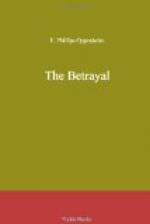She was swinging a very much beaded slipper backwards and forwards, and gazing at it thoughtfully.
“I don’t know,” she said. “I can’t help thinking of it sometimes. I suppose it is terribly wicked to keep anything back like that, isn’t it?”
“If you feel that,” I answered, “you had better go and tell your father everything.”
She looked at me quickly.
“Now you’re cross,” she exclaimed. “I’m sure I don’t know why.”
“I am not cross,” I said, “but I do not wish you to feel unhappy about it.”
“I don’t mind that,” she answered, lifting her eyes to mine, “if it is better for you.”
The door opened and Mr. Moyat appeared. Blanche was obviously annoyed, I was correspondingly relieved. I rose at once, and took my leave.
“Blanche got you to change your mind?” he said, looking at me closely.
“Miss Moyat hasn’t tried,” I answered, shaking him by the hand. “We were talking about something else.”
Blanche pushed past her father and came to let me out. We stood for a moment at the open door. She pointed down the street.
“It was just there he stopped me,” she said in a low tone. “He was very pale, and he had such a slow, strange voice, just like a foreigner. It was in the shadow of the market-hall there. I wish I’d never seen him.”
A note of real fear seemed to have crept into her voice. Her eyes were straining through the darkness. I forced a laugh as I lit my cigarette.
“You mustn’t get fanciful,” I declared. “Men die every day, you know, and I fancy that this one was on his last legs. Good-night.”
Her lips parted as though in an answering greeting, but it was inaudible. As I looked round at the top of the street I saw her still standing there in the little flood of yellow light, gazing across towards the old market-hall.
CHAPTER VIII
A WONDERFUL OFFER
On my little table lay the letter I expected, large, square, and white. I tore it open with trembling fingers. The handwriting was firm and yet delicate. I knew at once whose it was.
“Rowchester, Tuesday.
“Dear Mr. Ducaine,—My father wishes me to say that he and Lord Chelsford will call upon you to-morrow morning, between ten and eleven o’clock.—With best regards, I am,
“Yours sincerely,
“Angela Harberly.”
The letter slipped from my hands on to the table. Lord Chelsford was a Cabinet Minister and a famous man. What could he have to do with any appointment which the Duke might offer me? I read the few words over and over again. The handwriting, the very faint perfume which seemed to steal out of the envelope, a moment’s swift retrospective thought, and my fancy had conjured her into actual life. She was there in the room with me, slim and shadowy, with her quiet voice and movements, and with that haunting, doubtful look in her dark eyes. What had she meant by that curious warning? What was the knowledge or the fear which inspired it? If one could only understand!




